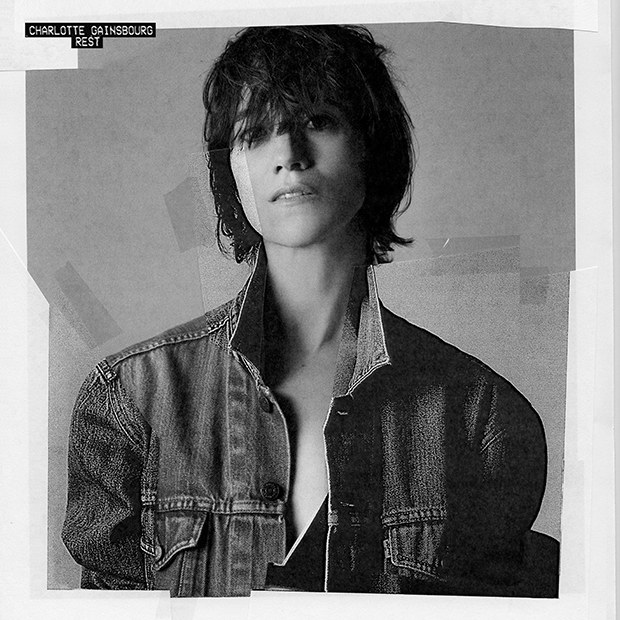Having a reputation for being a musical marionette controlled by meddling yet experimental fingers has to stop one day. From her commanding father (Charlotte For Ever), to wordsmith Jarvis Cocker (5:55), to mood-settings Air and to the eclectic Beck (IRM), infamously shy Anglo-French vocalist Charlotte Gainsbourg hasn’t had the confidence and self-belief to write her own lyrics (partly due to her understandable fear of being compared to her father French national treasure Serge Gainsbourg) and control the production of her recordings.
Instead the London-born artist has left her first four albums in the hands of musicians she admires. Admittedly it was a good judgement as it’s resulted in records that are successfully stylish and enthralling, yet lack the element of words straight from Charlotte’s heart and soul. Even IRM, an album about her brain-damaging skiing accident, was penned from Beck’s interpretation of the incident and aftermath.
At age 46, Charlotte Gainsbourg has finally decided it’s time to stop being scared of criticism and familial comparisons and has pushed herself to write her own lyrics and dictate her sound. Fifth album Rest reads like a open transparent diary of Charlotte’s inner perspective of the most important events in her life. Previously bottled up but now ready to unleash to the world, they embrace the vulnerable, modest and apprehensive character that’s noticeable in Charlotte’s acting roles.
Noticeably there’s chapters on grief in ‘Kate’, ‘Les Oxalis’ and ‘Lying With You’. The former two show her reaction to the death of her half-sister Kate Barry (1964-2013) in which she discusses Kate’s alcoholism and saying her final farewells after visiting her grave in Paris. Whilst ‘Lying With You’ talks about the final intense moments Charlotte spent with her father on his death bed, describing unusual details such as “Your bare leg came out to the sheet. Without modesty and in cold blood” and showing her well-documented devotion to him: “Let me imagine I was alone to love you.”
Some of her highlights though are when she borrows well known phrases and words and plays around them to display the lost feeling of childhood and rites of passage, in particular growing up, weddings and motherhood. ‘Ring-a-ring O’Roses’ includes the famous nursery rhyme, at the end of ‘Les Oxalis’ Charlotte’s daughter sings the alphabet and the title track ‘Test’ is performed like a bedtime lullaby. Whilst the album’s best track ‘Deadly Valentine’ recites wedding vows in a manner that sounds like she’s analysed their importance – it’s known that Charlotte and her family don’t have a fondness for marriage.
Something that is undeniable about every Charlotte Gainsbourg album is that they all sound very Gallic, whether it’s the breezy romantic atmosphere or Charlotte’s whispery sensual tone. On Rest, Charlotte keeps this consistency going by singing the majority of her words in French. It makes sense. To write in the language she feels more comfortable should be her first lyrical leap and it’s also highly appropriate and genuine, considering the context of her writing about her family, and from the heart. However, for those who don’t have a grasp of the French language it will be difficult to truly appreciate and applaud her words of sorrow. Yet discovering their translation and their meaning is part of the experience of enjoying the rewarding ‘Rest’ and Gainsbourg does include English lyrics to strike a balance.
Controlling her lyrics isn’t to say that Charlotte has now closed herself from collaboration. In fact this new-found confidence has allowed Charlotte to pick and manage her team. Charlotte decided that she wanted to create an album that sounds both filmic (hear the Woodkid-dramatic french horns, cellos and trombones) but also drenched in electronics. She teamed up with compatriot DJ Sebastian Akchóte (known professionally as SebastiAn), who’s known for his remixes, French House and for being the founder of an electronic music label to help her reach that direction.
SebastiAn does a wonderfully sympathetic job. He could have overfilled the record with distorted glitch sounds and thumping house beats but instead he adds a measured funky euro-disco touch to give an upbeat colour to tracks with gloomy words, such as the clappy ‘Sylvia Says’ (about the poetic Sylvia Plath), Daft Punk‘s ‘Robot Rock’ sound-a-like ‘Songbird in A Cage’ and the epic Kavinsky/Giorgio Moroder reminiscent ‘Les Oxalis’ to make it her most danceable record. Yet SebastiAn still keeps it wonderfully sophisticated (with harpischords and glockenspiels) and keeps in quiet moments to balance. In short, it stunningly embraces the whole spectrum of French music from it’s nostalgic charming allure to it’s electronic innovations.
Charlotte has also taken another bold step recently by directing all the music videos to her new singles. Perhaps she will step into the production shoes next time and based on this magnificent record it could be an exciting prospect.




